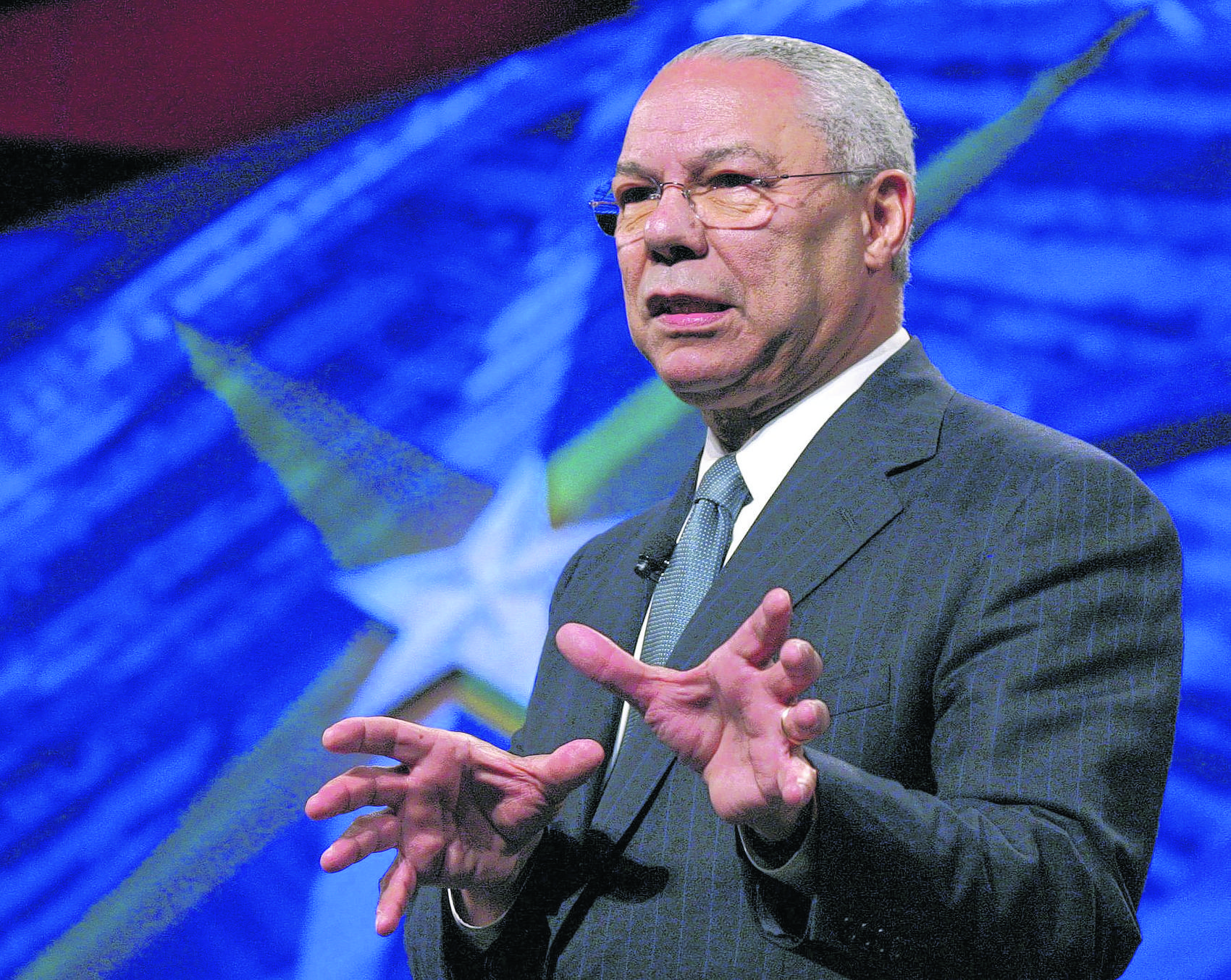
Jack Plunkett AP
Former Secretary of State Colin Powell gives the closing keynote at the 2016 World Congress of Information Technology in Austin, Texas. Powell has died from COVID-19 complications. He was 84.
WASHINGTON Colin Powell, who served Democratic and Republican presidents in war and peace but whose sterling reputation was forever stained by his faulty claims to justify the U.S. war in Iraq, died Monday of COVID-19 complications. He was 84.
A veteran of the Vietnam War, Powell spent 35 years in the Army and rose to the rank of four-star general. In 1989 he became the first Black chairman of the Joint Chiefs of Staff. In that role he oversaw the U.S. invasion of Panama and later the U.S. invasion of Kuwait to oust the Iraqi army in 1991.
But his legacy was marred when, in 2003, he went before the U.N. Security Council as secretary of state and made the case for U.S. war against Iraq at a moment of great international skepticism. He cited faulty information claiming Saddam Hussein had secretly stashed weapons of mass destruction. Iraq’s claims that it had no such weapons represented “a web of lies,” he told the world body.
In announcing his death on social media, Powell’s family said he had been fully vaccinated against the coronavirus.
“We have lost a remarkable and loving husband, father and grandfather and a great American,” the family said. Powell had been treated at Walter Reed National Medical Center in Bethesda, Maryland.
Peggy Cifrino, Powell’s longtime aide, said he had been treated over the past few years for multiple myeloma, a blood cancer. The Powell family’s social media post did not address whether Powell had any underlying illnesses.
Multiple myeloma impairs the body’s ability to fight infection, and studies have shown that those cancer patients don’t get as much protection from the COVID-19 vaccines as healthier people.
At the White House, President Joe Biden said Powell “embodied the highest ideals of both warrior and diplomat.”
Noting Powell’s rise from a childhood in a fraying New York City neighborhood, Biden said, “He believed in the promise of America because he lived it. And he devoted much of his life to making that promise a reality for so many others.”
Flags were lowered at the White House and State Department.
After the 9/11 attacks in 2001, Powell was the first American official to publicly lay the blame on Osama bin Laden’s al-Qaida network. He made a lightning trip to Pakistan in October of that year to demand that then-Pakistani President Pervez Musharraf cooperate with the United States in going after the Afghanistan-based group, which also had a presence in Pakistan, where bin Laden was later killed.
As President George W. Bush’s first secretary of state, Powell led a State Department that was dubious of the military and intelligence communities’ conviction that Saddam possessed or was developing weapons of mass destruction. And yet, despite his reservations, he presented the administration’s case that Saddam indeed posed a major regional and global threat in a speech to the U.N. Security Council in February 2003. The following month, Bush gave the go-ahead for the invasion. The U.N. speech, replete with Powell’s display of a vial of what he said could have been a biological weapon, was seen as a low point in his career, although he had removed some elements from the remarks that he deemed to have been based on poor intelligence assessments.
The U.S. overthrow of Saddam ended the rule of a brutal dictator. But the power vacuum and lawlessness that followed the invasion unleashed years of deadly sectarian fighting and chaos that killed countless Iraqi civilians, sparked a years-long insurgency, and unintentionally tilted the balance of power in the Middle East toward a U.S. rival, Iran. No Iraqi weapons of mass destruction were ever found.
Powell maintained in a 2012 interview with The Associated Press that on balance, the U.S. succeeded in Iraq.
“I think we had a lot of successes,” he said. “Iraq’s terrible dictator is gone.”
Bush said Monday that he and former first lady Laura Bush were “deeply saddened” by Powell’s death.
“He was a great public servant” and “widely respected at home and abroad,” Bush said. “And most important, Colin was a family man and a friend. Laura and I send Alma and their children our sincere condolences as they remember the life of a great man.”
Powell gained national prominence under Republican presidents and considered a presidential bid of his own, but ultimately moved away from the party. He endorsed Democrats in the past four presidential elections, starting with former President Barack Obama. He emerged as a vocal Donald Trump critic in recent years, describing Trump as “a national disgrace” who should have been removed from office through impeachment. Following the Jan. 6 storming of the U.S. Capitol, Powell said he no longer considered himself a Republican.